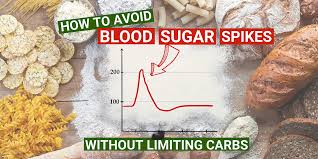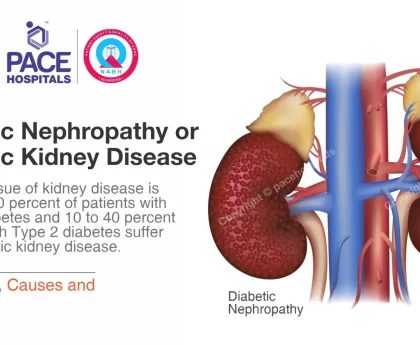You may be able to help keep your blood sugar stable by making changes to your diet, including reducing sugar and refined carbs, drinking enough water, and getting regular exercise.
0 of 59 secondsVolume 0%
00:00
00:59View video transcript
Blood sugar spikes occur when your blood sugar rises and then falls sharply after you eat.
In the short term, they can cause lethargy and hunger. Over time, your body may not be able to lower blood sugar effectively, which can lead to type 2 diabetes.
Diabetes is a rising health problem. In fact, 38.4 million people in the United States have diabetes, reports the Centers for Disease Control and Prevention (CDC)Trusted Source, and nearly 23% of them don’t know they have it.
Blood sugar spikes can also cause your blood vessels to harden and narrow, which can lead to a heart attack or stroke.
12 ways to prevent blood sugar spikes
This article looks at 12 simple things you can do to prevent blood sugar spikes.
1. Go low carb
Carbohydrates (carbs) are what cause blood sugar to rise. When you eat carbs, they are broken down into simple sugars. Those sugars then enter the bloodstream.
As your blood sugar levels rise, your pancreas releases a hormone called insulin, which prompts your cells to absorb sugar from the blood. This causes your blood sugar levels to drop.
Many studiesTrusted Source have shown that consuming a low carb diet can help lower blood sugar. Low carb diets also have the added benefit of aiding weight loss, which can also reduce blood sugar.
There are many ways to reduce your carb intake, including counting carbs.
Summary
A low carb diet can help lower blood sugar and aid weight loss. Counting carbs can also help.
2. Eat fewer refined carbs
Refined carbs, otherwise known as processed carbs, are sugars or refined grains.
Some common sources of refined carbs include:
- table sugar
- white bread
- white rice
- soda
- candy
- breakfast cereals
- desserts
Refined carbs have been stripped of almost all nutrients, vitamins, minerals, and fiber.
Refined carbs are said to have a high glycemic index (GI) because they are very easily and quickly digested by the body. This leads to blood sugar spikes.
The GI of carbs varies. A number of things affects it, including ripeness, what else you eat, and how the carbs are cooked or prepared.
Generally, whole grain foods have a lower GI, as do most fruits, non-starchy vegetables, and legumes.
Summary
Refined carbs have almost no nutritional value and increase the risk of type 2 diabetes and weight gain.
Living with diabetes? Explore our top resources.
3. Reduce your sugar intake
The average U.S. person consumes 17 teaspoons (71 grams)Trusted Source of added sugar daily. That translates to around 270 calories. While some of this is added as table sugar, most of it comes from processed and prepared foods, such as candy, cookies, and sodas.
The body has no nutritional need for added sugar like sucrose and high fructose corn syrup. They are, in effect, just empty calories. Your body breaks these simple sugars down very easily, causing an almost immediate spike in blood sugar.
StudiesTrusted Source show that consuming sugars is associated with developing insulin resistance. This is when the cells do not respond as they should to the release of insulin, resulting in the body being unable to control blood sugar effectively.
In 2016, the Food and Drug Administration (FDA)Trusted Source changed the way foods have to be labeled in the United States. Foods now have to display the amount of added sugars they contain in grams and as a percentage of the recommended daily maximum intake.
An alternative option to giving up sugar entirely is to replace it with sugar substitutes.
Summary
Sugar is effectively empty calories. It causes an immediate blood sugar spike, and high intake is associated with insulin resistance.
4. Reach and maintain a moderate weight
At present, in the United States, nearly 40%Trusted Source of adults ages 20 to 29 years and over 44% of adults ages 40 to 59 years are considered to have obesity.
Obesity or overweight can make it more difficult for your body to use insulin and control blood sugar levels. This can lead to blood sugar spikes and a corresponding higher risk of developing type 2 diabetes.
The precise ways it works are still unclear, but there’s evidence linkingTrusted Source obesity to insulin resistance and the development of type 2 diabetes.
Weight loss has been shown to improve blood sugar control. In one 2020 studyTrusted Source involving people with obesity, losing between 5% and 10% of body weight led to a significant reduction in fasting blood glucose levels.
Summary
Obesity and overweight make it difficult for your body to control blood sugar levels. Weight loss can improve blood sugar control.
5. Exercise more
Exercise helps control blood sugar spikes by increasing the sensitivity of your cells to the hormone insulin.
Exercise also causes muscle cells to absorb sugar from the blood, helping lower blood sugar levels. Both high intensity and moderate intensity exercise may reduce blood sugar spikes.
Whether you exercise on an empty or full stomach could have an effect on blood sugar control.
One 2019 study found exercise performed before breakfast controlled blood sugar more effectively than exercise done after breakfast.
Increasing exercise also has the added benefit of helping with weight loss, further helping manage blood sugar spikes.
Summary
Exercise increases insulin sensitivity and stimulates cells to remove sugar from the blood.
6. Eat more fiber
Fiber is made up of the parts of plant food that your body can’t digest. It’s often divided into two groups: soluble and insoluble fiber. Soluble fiber, in particular, can help manageTrusted Source blood sugar spikes.
It dissolves in water to form a gel-like substance that helps slow the absorption of carbs in the gut. This results in a steady rise and fall in blood sugar rather than a spike.
Fiber can also make you feel full, reducing your appetite and food intake.
Good sources of soluble fiber include:
- oatmeal
- nuts
- legumes
- some fruits, such as apples, oranges, and blueberries
- many vegetables
Summary
Fiber can slow the absorption of carbs and the release of sugar into the blood. It can also reduce appetite and food intake.
7. Drink more water
Not drinking enough water can lead to blood sugar spikes.
Dehydration causes your body to produce a hormone called vasopressin. This encourages your kidneys to retain fluid and stop the body from flushing out excess sugar in your urine. It also prompts your liver to release more sugar into the blood.
One 2011 study with 3,615 people found that those who drank at least 34 ounces (about 1 liter) of water per day were 21% less likely to develop high blood sugar than those who drank 16 ounces (473 ml) or less per day.
How much water you should drink is often up for discussion. Essentially, it depends on the individual. Always ensure you drink as soon as you’re thirsty, and increase your water intake during hot weather or while exercising.
Stick to water rather than sugary juice or sodas, since the sugar content will lead to blood sugar spikes.
Summary
Dehydration negatively affects blood sugar control. Over time, it can lead to insulin resistance and type 2 diabetes.
8. Introduce some vinegar into your diet
Many believe vinegar, particularly apple cider vinegar, has health benefits. It has been linked to weight loss, cholesterol reduction, antibacterial properties, and blood sugar control.
According to a 2018 reviewTrusted Source, some research suggests that consuming vinegar can increase insulin response and may cause a slight reduction in blood sugar spikes. However, the results may be very mild, and more research is needed.
The addition of vinegar can also lower the GI of a food, which can help reduce blood sugar spikes.
Summary
Vinegar has been shown to increase insulin response and help control blood sugar when taken with carbs.
9. Get enough chromium and magnesium
Studies show both chromium and magnesium can be effective in controlling blood sugar spikes.
Chromium
Chromium is a mineral you need in small amounts.
It’s thought to enhance the actionTrusted Source of insulin. This could help control blood sugar spikes by encouraging the cells to absorb sugar from the blood.
Recommended dietary intakes for chromium vary by age and sex. Rich food sources include:
- broccoli
- egg yolks
- shellfish
- tomatoes
- Brazil nuts
Magnesium
Magnesium is another mineral that’s been linked to blood sugar control.
In one 2019 studyTrusted Source including 70 people with obesity and no diabetes, the participants who received 300 milligrams of magnesium sulfate in a supplement had improved plasma insulin levels, lipid profile, and insulin resistance.
A 2016 study investigated the combined effects of supplementing with chromium and magnesium on blood sugar. Researchers found that a combination of the two increased insulin sensitivity more than either supplement alone.
Recommended dietary intakes for chromium vary by age and sex. Rich food sources include:
- spinach
- almonds
- avocados
- cashews
- peanuts
Summary
Chromium and magnesium may help increase insulin sensitivity. Evidence shows they may be more effective together.
10. Add some spice to your life
Cinnamon and fenugreek have been used in alternative medicine for thousands of years. They have both been linked to blood sugar control.
Cinnamon
The scientific evidence for using cinnamon in blood sugar control is mixed.
A 2019 reviewTrusted Source of human studies on the effects of powdered cinnamon on insulin levels in people with type 2 diabetes mellitus found that, in many studies, fasting blood glucose levels and serum insulin were reduced.
Researchers also found that the most studied cinnamon species was Cinnamomum cassia, the type most often found in spices in U.S. grocery stores. More research is needed to determine how effective cinnamon may be.
However, there are also studies that show cinnamon has no effect on blood sugar. One review from 2012Trusted Source looked at 10 high quality studies including a total of 577 people with diabetes. Researchers found no significant difference in blood sugar spikes after participants had taken cinnamon.
There are two types of cinnamon:
- Cassia: Can come from several different species of Cinnamomum trees. This is the type most commonly found in most U.S. supermarkets.
- Ceylon: Comes specifically from the Cinnamomum verum tree. It’s more expensive but may contain more antioxidants.
Cassia cinnamon contains a potentially harmful substance called coumarin.
The European Food Safety Authority (EFSA)Trusted Source has set the tolerable daily intake of coumarin at 0.045 milligrams per pound of body weight in kilograms (0.1 mg/kg). This is around half a teaspoon (1 gram) of Cassia cinnamon for a 165-pound (75-kg) person.
Fenugreek
Fenugreek seeds are high in soluble fiber. This helps prevent blood sugar spikes by slowing the digestion and absorption of carbs.
Earlier studies suggest that blood sugar levels may benefit from more than just the seeds. An analysis of 10 studiesTrusted Source found that fenugreek significantly reduced blood sugar 2 hours after eating.
More recent studiesTrusted Source have reviewed the benefits of fenugreek for people with prediabetes. These studies found that fasting blood glucose levels were significantly decreased.
Fenugreek may help reduce blood sugar spikes. It can be added to food but does have quite a strong taste, so some people prefer to take it as a supplement.
Summary
Both cinnamon and fenugreek are relatively safe. They may have beneficial effects on your blood sugar if you take them with a meal that contains carbs.
11. Try berberine
Berberine is a chemical that can be extracted from several different plants. It’s been used in traditional Chinese medicine for thousands of years. Some of its uses include cholesterol reduction, weight loss, and blood sugar control.
A 2023 review of 37 studies that included 3,048 participants found that berberine could reduce fasting plasma glucose, HbA1c (a test that measures average blood sugar levels over the past 3 months), and a 2-hour postprandial blood sugar test in people with diabetes.
Although berberine appears to be fairly safe, speak with your doctor before taking it if you have any health conditions or are taking any medication.
Summary
Berberine has minimal side effects. Studies have shown it can reduce blood sugar spikes after you eat it.
12. Consider these lifestyle factors
To reduce your blood sugar spikes, also consider these lifestyle factors that can affect blood sugar.
Stress
Stress can impair your health in a number of ways, causing headaches, increased blood pressure, and anxiety. It can also affectTrusted Source blood sugar.
As stress levels go up, your body releases certain hormones. The effect is to release stored energy in the form of sugar into your bloodstream for the fight-or-flight response.
Actively addressing stress has also been found to benefit your blood sugar.
Sleep
Both too little and too much sleep have been associated with poor blood sugar control. Even having one or two bad nights can affect your blood sugar levels.
According to the CDCTrusted Source, getting fewer than 7 hours of sleep per night may make your diabetes harder to manage. Too little sleep can:
- increase insulin resistance
- increase appetite the next day
- reduce how satisfied and full you feel after eating
- increase cravings for foods that are high in carbs and sugar
- make weight loss more difficult
- raise your blood pressure
- increase your risk of heart attack
- decrease the effectiveness of your immune system
- increase your risk of anxiety and depression
Alcohol
Alcoholic drinks often contain a lot of added sugar. This is particularly true for mixed drinks and cocktails, which can contain up to 30 grams of sugar per serving.
The sugar in alcoholic drinks causes blood sugar spikes in the same way as added sugar in food. Most alcoholic drinks also have little or no nutritional value. As with added sugar, they are effectively empty calories and may increase your risk of hyperglycemia.
Summary
Poor sleep, stress, and high alcohol intake all negatively affect blood sugar. That’s why it’s important to consider lifestyle strategies as well as diet.
Takeaway
Simple dietary changes, such as sticking to a diet that prioritizes whole grains and fiber and avoids added sugars and refined grains, can help you avoid blood sugar spikes.
Getting regular physical activity, maintaining a moderate weight, and drinking plenty of water can also have added benefits to your health beyond helping control your blood sugar.
If you have any health conditions or are taking any medications, speak with your doctor before making any changes to your diet.
For most people, making these diet and lifestyle changes is a great way to lower your risk of developing insulin resistance or type 2 diabetes.


